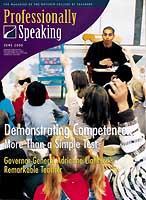Register Available
Electronically Through College Library
The College will make much of the information on its register available
electronically by the end of May 2000.
College members and the public will be able to obtain information from the College's
public register through a dedicated terminal in the College's 6th floor library. At the
same time, the College will make it possible for employers and faculties of education to
access the public register over the Internet. Access will be password-protected.
"This initiative will make it easier to obtain information about a College member
and improve the protection of the public," said College Registrar Margaret Wilson.
"School boards and other employers, for example, will be able to check if applicants
are in good standing with the College and if any restrictions apply to their Certificate
of Qualification."
The Ontario College of Teachers Act defines clearly the information from the
College's register that must be made public. Members' addresses and phone numbers remain
confidential. The public information includes:
- the member's name and the information that appears on the member's Certificate of
Qualification and Registration, including degrees, Basic Qualifications and Additional
Qualifications
- the terms, conditions and limitations imposed on the Certificate of Qualification and
Registration
- a notation of any revocation, cancellation and suspension of a Certificate of
Qualification and Registration
- information that a committee required by the Ontario College of Teachers Act
decides should be included
- members' registration numbers and the date of issue of their Certificates of
Qualification.
By the end of the year, the College hopes to make the public registry available to
everyone via the Internet.
College Proposes
Changes to Teachers' Qualifications
The regulation that describes the
qualifications necessary to become a teacher has received its first major overhaul since
1978 with the approval by the College Council on February 24th of changes to Regulation 184/97 - Teachers' Qualifications, made under the Ontario
College of Teachers Act. The regulation forms the basis on which the College issues
teaching certificates.
The amendments approved by the College Council cover registration and basic
qualifications for teachers, supervisory officer qualifications and include a number of
changes that improve or clarify the wording of the regulation. Like all regulations
approved by the Council, the amendments must also be approved by Cabinet before they take
effect.
One of the key changes is that new applicants to the College who have trained outside
Canada in a language other than English or French will be required to prove proficiency in
one of the two languages.
"We receive about 1,500 applications each year for teachers trained outside
Canada. A language proficiency requirement will ensure that the applicants in that group
who were not educated in either English or French meet the level of language competency
expected of teachers in Ontario," says College Registrar Margaret Wilson.
This proposal for a test of language competence for foreign-trained teachers was
presented to the Ministry of Education a year ago, but the government has taken no action
on it yet.
Another significant change being proposed is that the teacher education pre-service
practicum be extended from 40 to 60 days. This change was recommended in the final report
on the pilot project of a two-year teacher education program conducted at three Ontario
universities between 1995 and 1997. The longer practicum will bring Ontario closer to the
practicum requirement in other Canadian jurisdictions.
A number of the proposed changes will affect technological studies teachers or
candidates. Pre-service candidates will be required to focus on one area of a broad-based
technological curriculum and complete a course at both the basic and advanced level. Proof
of competence will be based on an assessment of advanced knowledge and skills in at least
one skill set of the broad-based technological area selected for study. The intent of this
change is to ensure that issues of health and safety are addressed in training.
Changes will allow people with a degree plus one year of work experience to be eligible
for the technological studies program. These changes are designed to reduce barriers to
applicants and encourage people with university degrees to enter teacher education
programs for technological studies.
ADVANCED STUDIES
Candidates in a Principal's Qualifi-cation Program will be
required to complete the practicum between Parts I and II of the program. The requirement
of a master's degree for the Principal's Qualification Program and the Supervisory
Officer's Qualification Program has been clarified to indicate a requirement of 30 credit
semester hours beyond what is required for a pre-service program.
The Council approved a number of other changes of definition or
clarification.
- The academic qualifications for teachers seeking a Certificate of Qualification should
be defined as a university degree of three years or 90 credit hours. Thirty credit hours
of the 90 should be beyond the first year of studies and a minimum of 30 should be related
to the Ontario curriculum.
- The definition of general studies will include computer studies courses developed from
the technological education curriculum policy document.
- The requirement for wage-earning experience for tech teachers will be changed to
documented work experience so that co-op experience can be counted.
- Another recommendation will limit the validity of an Interim Certificate of
Qualification to three years, with the possibility of a three-year extension if an
orientation program has been successfully completed.
1 | 2
| 3 | 4 | 5 | 6

